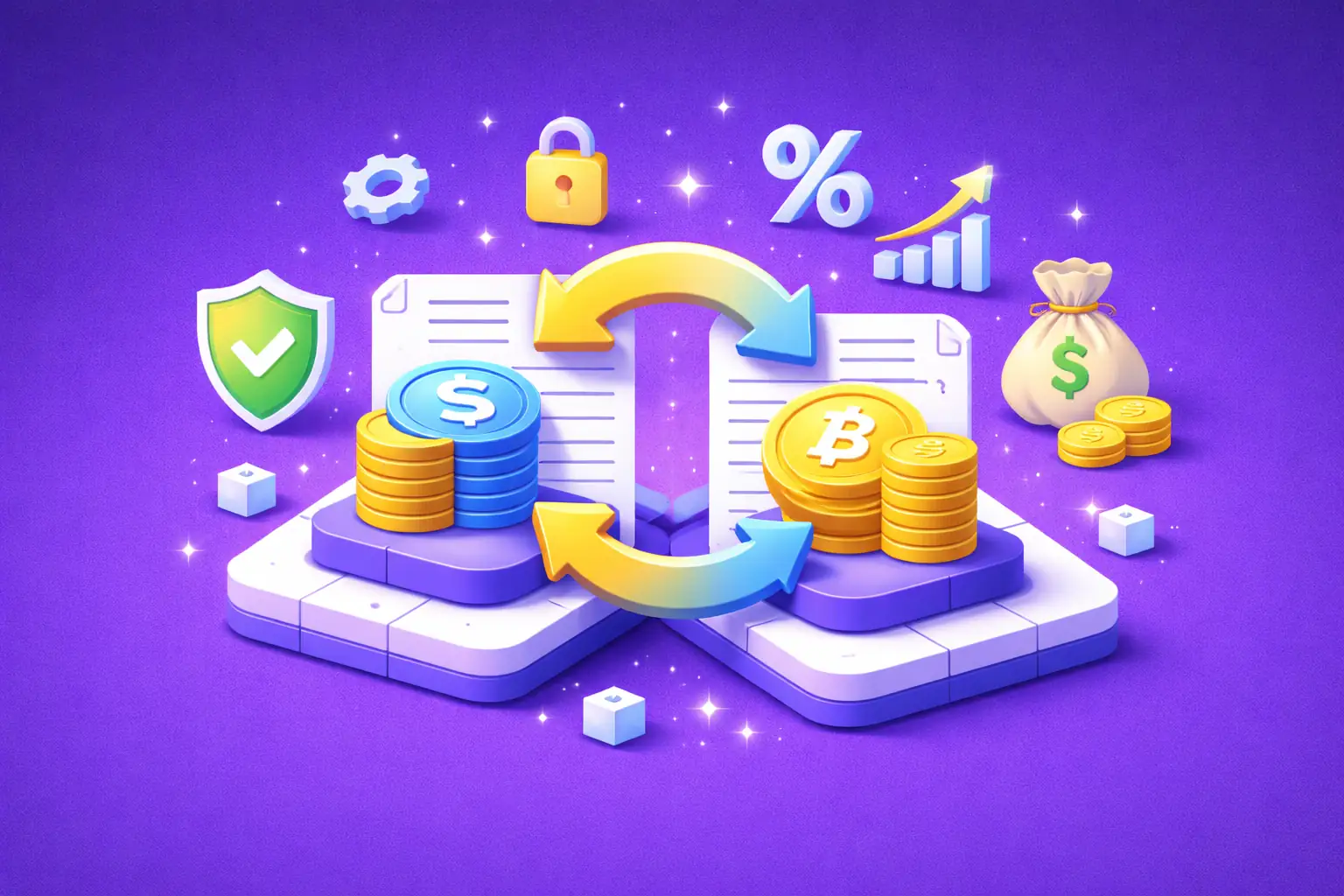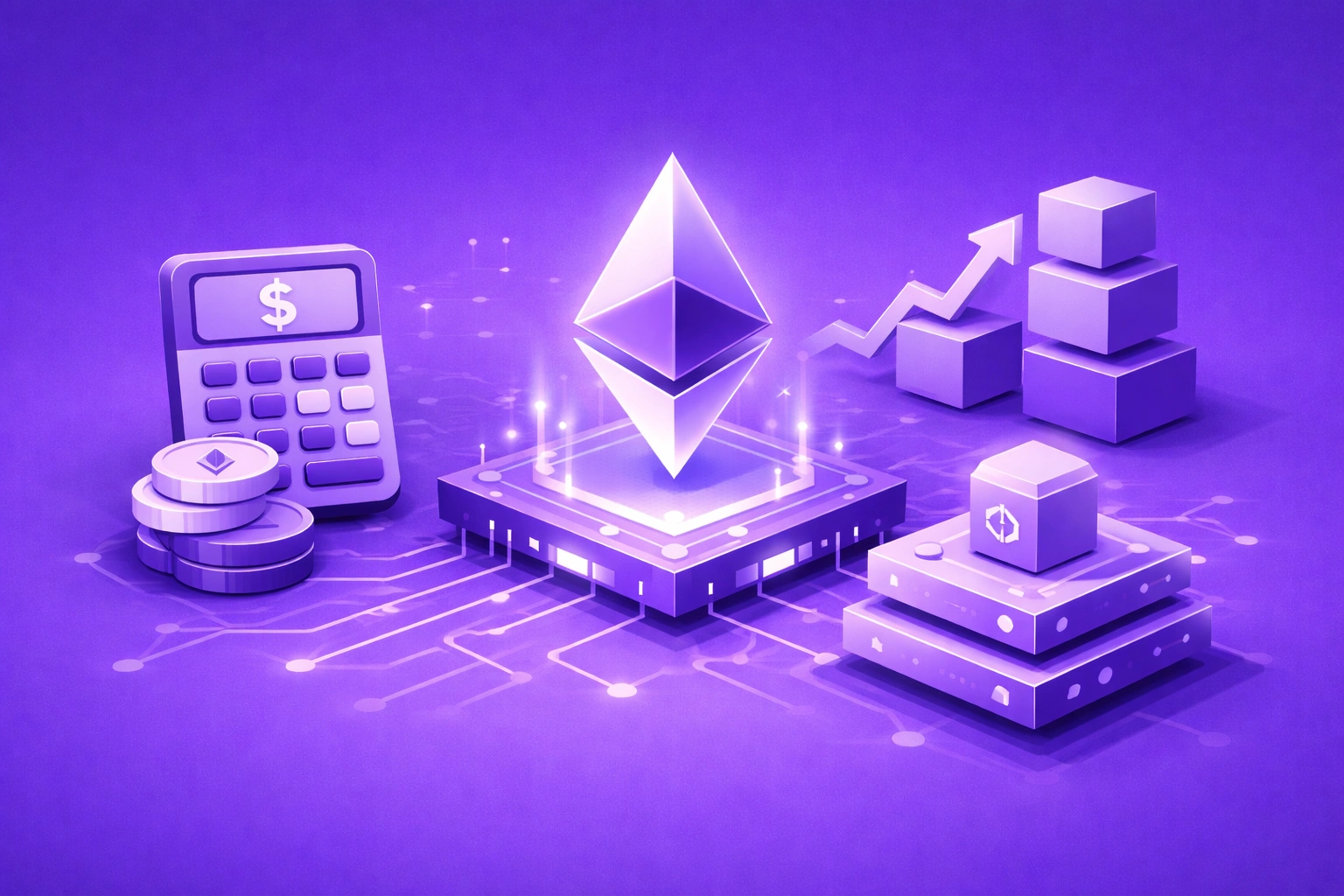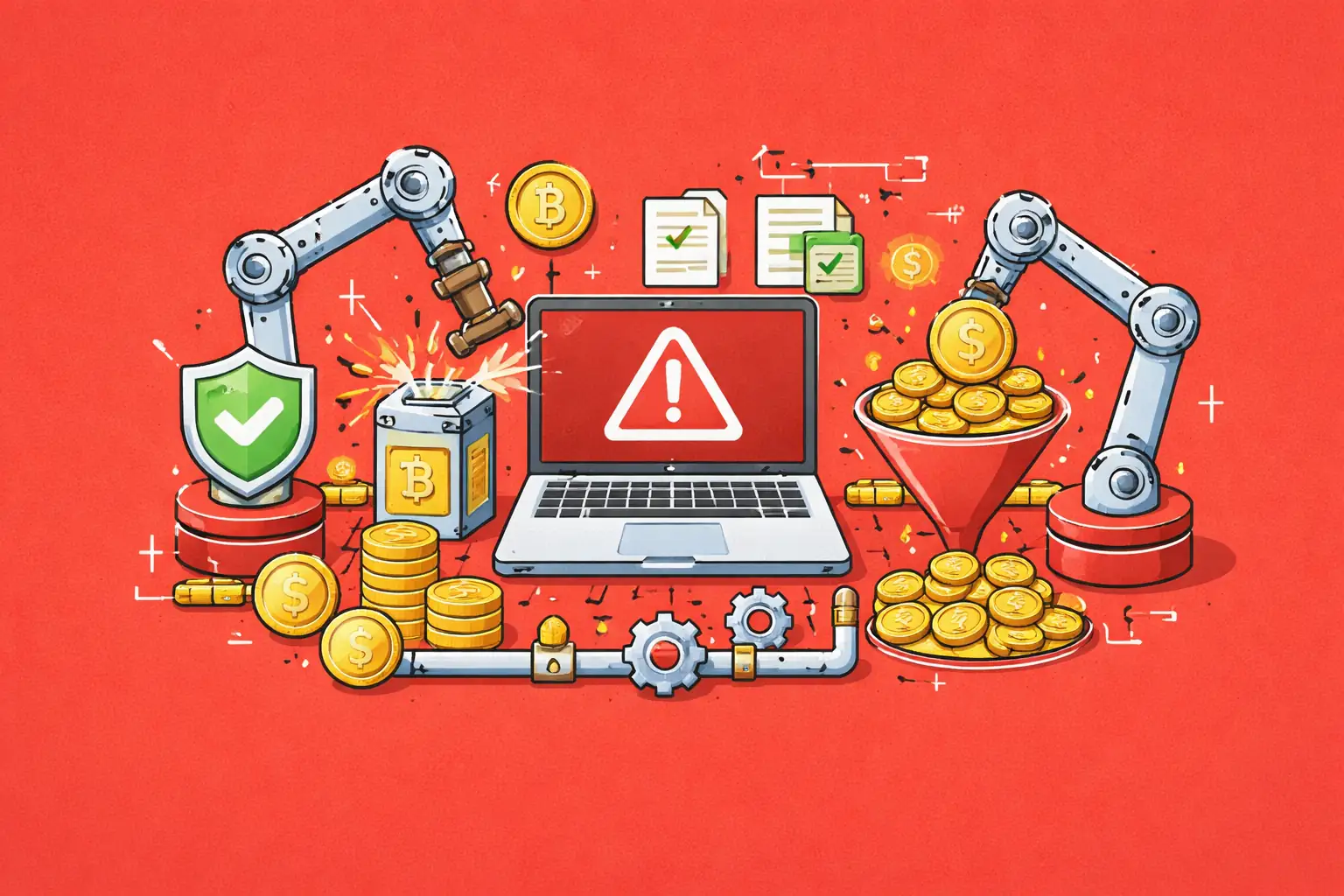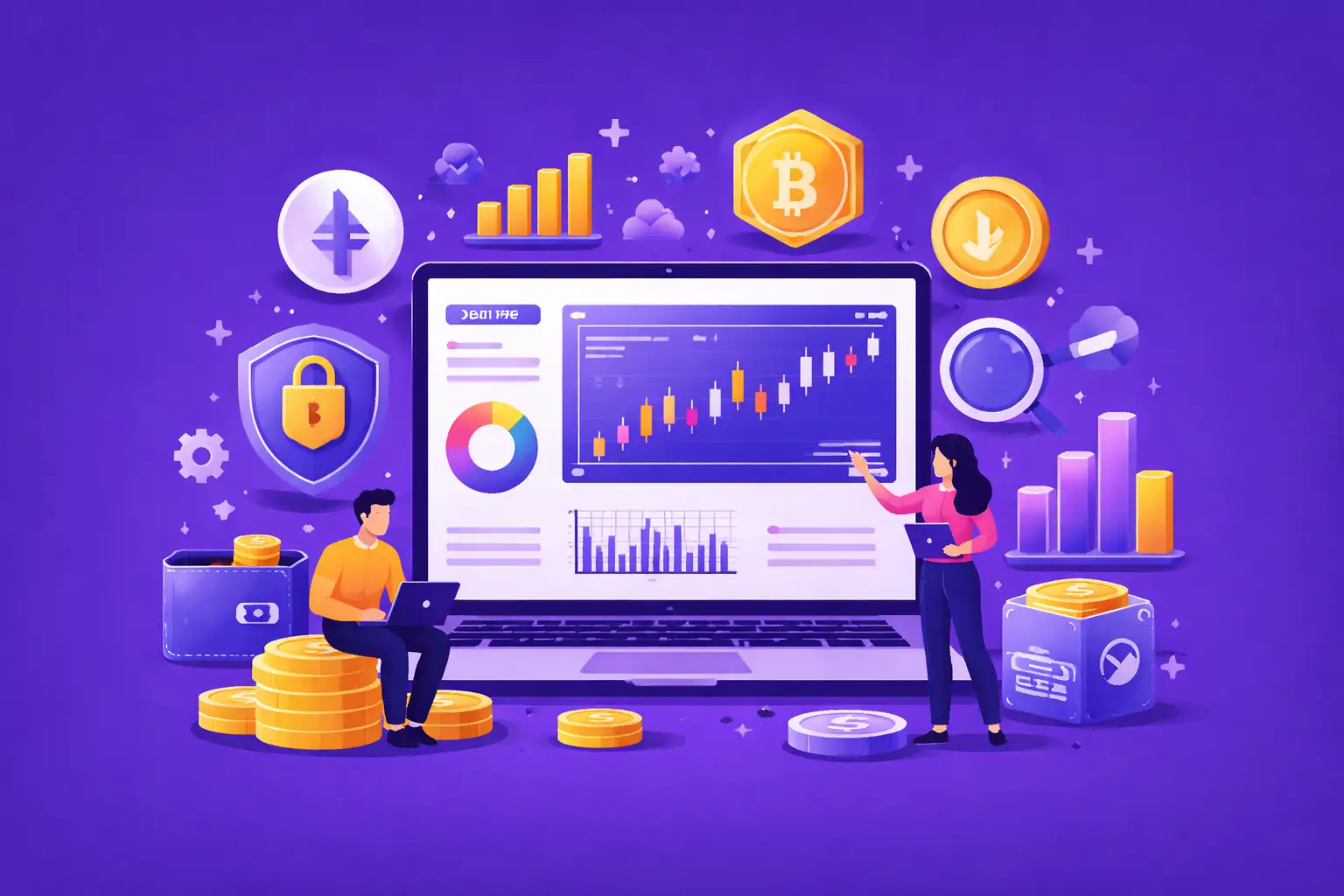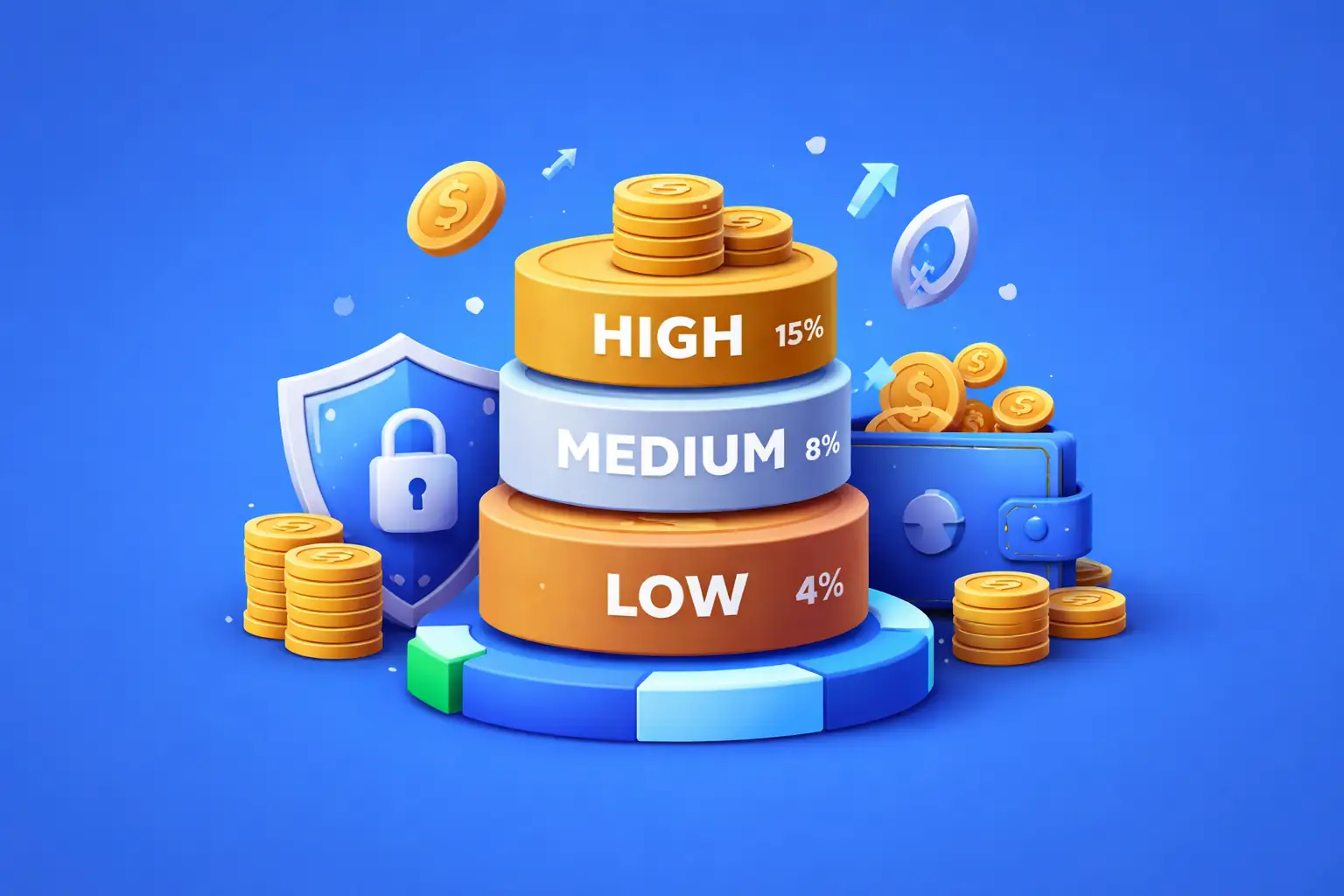Key Takeaways
- 01A debt swap in DeFi allows users to replace an existing borrowing position with a new one that offers better terms, lower rates, or improved collateral efficiency.
- 02Unlike traditional refinancing, DeFi debt swaps happen instantly through smart contracts with no bank approvals, credit checks, or paperwork required.
- 03Flash loans are a key technology enabling DeFi debt swaps by providing temporary liquidity to close one position and open another in a single atomic transaction.
- 04Users can swap debt between protocols (e.g., moving from Aave to Compound), between collateral types, or between variable and fixed interest rates.
- 05DeFi debt swaps help users avoid liquidation by restructuring positions before collateral values fall below critical thresholds.
- 06Protocols like DeFi Saver, Instadapp, and Furucombo have built specialized tools that make debt swaps accessible even to non technical users.
- 07Smart contract risk, slippage, and gas costs are the primary risks to consider when executing debt swaps on chain.
- 08Debt swaps play a critical role in DeFi portfolio management, helping users maximize capital efficiency across lending markets.
- 09Cross chain debt swaps are an emerging frontier, allowing users to move debt positions between different blockchain networks seamlessly.
- 10As DeFi matures, debt swaps will become a standard financial tool, similar to how refinancing is a normal part of traditional banking today.
-
In traditional finance, debt swaps have been used for decades by banks, governments, and large corporations to manage risk, reduce interest costs, and restructure obligations. Now, decentralized finance is bringing this powerful concept to the blockchain, making debt swaps in DeFi accessible to anyone with a crypto wallet.
Imagine you borrowed money at a high interest rate, and a few months later, rates dropped significantly. In the traditional world, refinancing that loan involves paperwork, bank approvals, and weeks of waiting. In DeFi, a debt swap lets you replace that expensive loan with a cheaper one in a single transaction, executed by a smart contract, with no bank involved.
Whether you are a DeFi user looking to optimize your borrowing positions, a startup founder exploring decentralized financial products, or a developer building the next generation of lending protocols, understanding how debt swaps work in DeFi is essential knowledge. This guide will explain everything in plain language with real examples, visual diagrams, and actionable insights.
-
What Is a Debt Swap?
A debt swap is the process of replacing an existing debt obligation with a new one that has different (usually more favorable) terms. In DeFi, this happens on chain through smart contracts, allowing users to switch lending protocols, change collateral types, or move to lower interest rates without manually closing and reopening positions.
Why Debt Swaps Matter in Decentralized Finance?
In DeFi, borrowing is one of the most fundamental activities. Users deposit collateral (like ETH, WBTC, or stablecoins) into lending protocols and borrow other assets against it. But once a loan is taken, conditions change. Interest rates fluctuate. New protocols launch with better terms. Collateral values swing wildly. A position that was profitable last week might become dangerous today.
This is where debt swaps become essential. They give DeFi users the ability to adapt, optimize, and protect their positions without going through the painful process of manually unwinding everything.
Move from a 5% variable rate on one protocol to a 2.8% rate on another. Every basis point saved adds up over time, especially on large positions.
Swap to a more stable collateral type or a protocol with higher loan to value ratios before your position gets liquidated in a market downturn.
Free up locked capital by moving to protocols that accept more collateral types or offer higher borrowing limits for the same deposit.
Move your entire debt position from one protocol to another when a newer platform offers better features, security, or incentive rewards.
Replace your ETH collateral with stETH to earn staking rewards while borrowing, or switch to a less volatile asset during uncertain markets.
Switch from variable to fixed interest rates (or vice versa) based on your market outlook and risk tolerance, locking in predictable costs.
How a DeFi Debt Swap Works: Step by Step Flow
A DeFi debt swap might sound complex, but the beauty of smart contracts is that all the steps happen automatically in a single transaction. Let us break down what happens behind the scenes when a user executes a debt swap, for example moving a borrowing position from Aave to Compound.
The smart contract borrows the exact amount needed to repay the existing debt from a flash loan provider. This loan costs zero collateral and must be repaid within the same transaction.
The flash loaned funds are used to fully repay the existing debt on Protocol A (e.g., Aave). This frees up the user’s collateral that was locked in that position.
With the debt cleared, the smart contract withdraws the user’s collateral from Protocol A. The collateral is now free and ready to be redeposited elsewhere.
The collateral is deposited into Protocol B (e.g., Compound). This establishes the new position where the user will continue their borrowing activity.
The contract borrows the required amount from Protocol B against the newly deposited collateral. This creates the replacement debt at the new, more favorable terms.
The newly borrowed funds are used to repay the flash loan (plus a small fee). The entire operation is complete. The user now has the same position, but on a better protocol.
All six steps above happen in a single blockchain transaction. If any step fails, the entire transaction reverts and nothing changes. This is called atomicity, and it is what makes DeFi debt swaps safe from partial execution. Either the complete swap succeeds, or nothing happens at all. Your original position remains untouched.
Types of Debt Swaps in DeFi
Debt swaps in decentralized finance are not a one size fits all operation. Depending on what you are trying to achieve, there are several distinct types of swaps available. Understanding each type helps you choose the right strategy for your situation.
Traditional Finance vs DeFi Debt Swaps
Debt swaps are not a new invention. Banks and financial institutions have used them for decades. What DeFi changes is the speed, accessibility, and transparency of the process. Here is a direct comparison.
| Dimension | Traditional Finance | Decentralized Finance (DeFi) |
|---|---|---|
| Processing Time | Days to weeks | Seconds to minutes |
| Intermediaries | Banks, brokers, legal teams | Smart contracts only |
| Credit Check | Required | Not required (collateral based) |
| Accessibility | Limited by geography and eligibility | Global, permissionless |
| Transparency | Opaque (terms vary by negotiation) | Fully transparent (on chain) |
| Minimum Amount | Often high minimums ($50K+) | No minimum |
| Operating Hours | Business hours only | 24/7, 365 days |
| Fees | Origination fees, legal fees | Gas fees + flash loan fees (~0.05%) |
The Role of Flash Loans in Debt Swaps
Flash loans are the secret engine behind most DeFi debt swaps. They are one of the most innovative concepts unique to decentralized finance, with no equivalent in traditional banking.
A flash loan allows you to borrow any amount of cryptocurrency with zero collateral, as long as you repay it within the same blockchain transaction. If the repayment does not happen, the entire transaction is reversed automatically. This creates a risk free lending mechanism that is impossible in the traditional world.
Imagine you want to move your furniture from one apartment to another, but you need a truck. A flash loan is like borrowing a truck for free, with the condition that you return it before the end of the day. If you do not return it, the entire move never happened and everything goes back to how it was. You never actually “owned” the truck; you just used it to facilitate the move.
In the context of debt swaps, flash loans provide the temporary liquidity needed to repay your old debt before the new debt is created. Without flash loans, you would need to have enough spare capital to repay the old loan first, which defeats the purpose for most users. Flash loans eliminate this capital requirement entirely.
Key DeFi Protocols and Tools for Debt Swaps
Several protocols have built specialized infrastructure to make debt swaps accessible to everyday DeFi users. You do not need to write smart contract code yourself; these platforms handle the complexity behind clean, user friendly interfaces.
Offers one click debt shifting between Aave, Compound, and Maker. Also provides automated liquidation protection that can trigger debt swaps automatically when positions become risky.
Provides smart account infrastructure that enables complex DeFi operations including protocol migration, collateral swaps, and leverage adjustments across multiple platforms in a single transaction.
A visual interface where users can build custom DeFi strategies by combining multiple actions (including flash loans and debt swaps) like building blocks, without writing any code.
Risks and Considerations of DeFi Debt Swaps
While debt swaps are powerful tools, they are not without risk. Understanding these risks is essential before executing any swap, especially with large positions.
Debt swap transactions interact with multiple smart contracts simultaneously. A bug in any of these contracts could lead to loss of funds. Only use well audited protocols and tools.
If a collateral swap involves trading assets on a decentralized exchange, slippage (the difference between expected and actual price) can reduce the value of your position. Large swaps in low liquidity pools are especially vulnerable.
Debt swaps are complex transactions that interact with multiple protocols. On Ethereum mainnet during high congestion, gas fees can be significant. Layer 2 networks offer much cheaper execution.
If any part of the flash loan transaction fails, the entire operation reverts. While this means you do not lose funds, you still pay for the gas of the failed transaction. This risk is relatively low but not zero.
Price oracles that feed data to lending protocols could theoretically be manipulated during a swap. Reputable protocols use decentralized oracle networks like Chainlink to minimize this risk.
Real World DeFi Debt Swap Scenarios
To make this more concrete, here are practical scenarios where DeFi users would benefit from executing a debt swap.
Alice borrowed 10,000 USDC on Aave at a variable rate of 4.5%. She notices that Compound is currently offering 2.1% for the same loan. Using DeFi Saver, she executes a protocol swap in one click. Her annual interest cost drops from $450 to $210, saving her $240 per year without moving any of her collateral manually.
Bob has ETH collateral backing a DAI loan on Maker. ETH price starts dropping sharply and his position approaches the liquidation threshold. Instead of panic selling, Bob executes a collateral swap, replacing his ETH with USDC. His position is now safe from price volatility, and he can swap back to ETH when the market stabilizes.
Carol has ETH deposited as collateral on Aave. She realizes she could swap her regular ETH for wstETH (which earns staking rewards at ~3.5% APR) while still using it as collateral. After the collateral swap, her collateral is now earning yield while backing her loan, effectively reducing her net borrowing cost significantly.
Leading DeFi Lending Protocols Supporting Debt Operations
| Protocol | Flash Loans | Rate Switching | Multi Chain | TVL Range |
|---|---|---|---|---|
| Aave V3 | 🟢 Yes | 🟢 Yes | 🟢 10+ chains | $10B+ |
| Compound V3 | 🟡 Partial | 🔴 No | 🟢 5+ chains | $3B+ |
| MakerDAO / Sky | 🔴 No (via 3rd party) | 🔴 Fixed only | 🟡 Ethereum primary | $8B+ |
| Spark Protocol | 🟢 Yes | 🟡 Limited | 🟡 Expanding | $2B+ |
| Morpho | 🟢 Yes | 🟢 Peer to peer matching | 🟡 Growing | $4B+ |
Business and Enterprise Applications of Debt Swaps
Debt swaps in DeFi are not just for individual traders. They have significant implications for businesses, DAOs, and institutional participants in the decentralized economy.
- DAO Treasury Management: Decentralized organizations often borrow against their token treasuries. Debt swaps allow DAOs to optimize their borrowing costs across protocols, potentially saving millions in annual interest payments on large positions.
- Institutional DeFi: Institutional investors and crypto funds use debt swaps to rebalance their leverage positions efficiently. The ability to restructure debt in real time, without counterparty risk, is a major advantage over traditional OTC markets.
- Yield Strategy Automation: Businesses building DeFi products can integrate debt swap logic into automated vault strategies that continuously seek the best borrowing rates across the ecosystem.
- Risk Management: Corporate treasuries using DeFi can use collateral swaps to dynamically adjust their risk exposure based on market conditions, moving between stablecoins and volatile assets as needed.
Blockchain solution providers like Nadcab Labs help enterprises design and integrate DeFi debt management systems into their financial infrastructure, ensuring that smart contract interactions are secure, gas efficient, and aligned with organizational risk policies.
The Future of Debt Swaps in DeFi
Debt swaps are still a relatively young feature in the DeFi ecosystem, but they are evolving rapidly. Here is what the future likely holds.
AI powered and algorithmic systems will continuously monitor borrowing rates across all DeFi protocols and automatically execute debt swaps when savings exceed a user defined threshold, completely hands free.
Interoperability protocols will enable users to move their entire debt position from Ethereum to Arbitrum, Base, or any other chain in a single transaction, chasing the lowest rates and gas costs globally.
As credit scoring and on chain reputation systems mature, debt swaps may extend to undercollateralized lending, enabling more capital efficient financial operations closer to traditional banking models.
The ultimate vision is bridging on chain DeFi debt with off chain traditional financial instruments, allowing users to swap between a crypto lending position and a real world loan product through a unified interface.
Conclusion
Debt swaps in DeFi represent one of the most practical and impactful innovations in decentralized finance. By enabling users to seamlessly replace, restructure, and optimize their borrowing positions through smart contracts, DeFi has replicated and improved upon a financial tool that was previously reserved for banks and large institutions.
From protocol migration and collateral switching to interest rate optimization and liquidation prevention, debt swaps give every DeFi participant the power to actively manage their financial positions with speed and precision that traditional finance simply cannot match.
As the DeFi ecosystem matures, debt swaps will become as routine as checking your bank balance. Cross chain portability, automated optimization, and institutional grade tools are already in development. For users, developers, and businesses navigating the decentralized economy, understanding how debt swaps work today is the foundation for building smarter financial strategies tomorrow.
Frequently Asked Questions
No. Platforms like DeFi Saver, Instadapp, and Furucombo provide visual interfaces where you can execute debt swaps with a few clicks. The smart contract complexity is completely abstracted away from the user experience. You simply select your current position, choose where you want to move it, and confirm the transaction.
The total cost includes the flash loan fee (usually 0.05% to 0.09% of the borrowed amount) plus blockchain gas fees. On Ethereum mainnet, gas can range from $20 to $200+ depending on network congestion. On Layer 2 networks like Arbitrum or Optimism, the same operation might cost less than $1 in gas. Always calculate whether the savings from the swap justify the execution cost.
Most debt swap tools support partial swaps. You can choose to move only a portion of your debt to a new protocol while keeping the rest in the original position. This is useful for diversifying risk across multiple lending platforms or testing a new protocol with a smaller amount before committing fully.
Tax treatment varies significantly by jurisdiction and the specific type of swap. Collateral swaps that involve trading one crypto asset for another may trigger taxable events in many countries. Protocol to protocol swaps that keep the same assets may have different treatment. It is strongly recommended to consult a crypto tax professional and use portfolio tracking tools to document all swap transactions.
Yes. Tools like DeFi Saver’s Automation feature allow users to set predefined conditions (such as “swap my debt if the interest rate exceeds 5%” or “swap collateral if my health factor drops below 1.5”). When these conditions are met, the system automatically executes the debt swap on your behalf using keeper bots and smart contract logic.
The terms are often used interchangeably in DeFi, but there is a subtle distinction. Refinancing typically refers to replacing your debt on the same protocol with better terms (like moving from Aave V2 to Aave V3). A debt swap is the broader term that includes moving between entirely different protocols, swapping collateral types, or changing the borrowed asset. Every refinance is a debt swap, but not every debt swap is a refinance.
Yes, most debt swap platforms are accessible through mobile wallet browsers such as MetaMask Mobile, Coinbase Wallet, or Rainbow. The user experience may be more compact on smaller screens, but the functionality is identical to the desktop version. Make sure you are connecting to the official website of the platform to avoid phishing scams.
If the destination protocol is exploited, your deposited collateral and borrowed position on that protocol are at risk, just like any other user of that protocol. This is why researching the security track record, audit history, and insurance options of a protocol before swapping to it is critical. Diversifying positions across multiple audited protocols can also help mitigate this risk.
Flash loan powered debt swaps are primarily an Ethereum and EVM ecosystem feature due to the composability of smart contracts on these chains. Bitcoin does not natively support the complex smart contract logic required for atomic debt swaps. However, wrapped Bitcoin (WBTC) can be used as collateral in EVM based debt swap operations. Some newer Bitcoin Layer 2 platforms are exploring similar functionality.
Before executing, calculate the total cost of the swap (flash loan fee plus gas fee) and compare it against the projected savings over your intended borrowing period. For example, if the swap costs $50 but saves you 2% annually on a $10,000 position, that is $200 per year in savings, making the swap clearly worthwhile. Most debt swap platforms show you a preview of the expected outcome before you confirm.
Reviewed & Edited By

Aman Vaths
Founder of Nadcab Labs
Aman Vaths is the Founder & CTO of Nadcab Labs, a global digital engineering company delivering enterprise-grade solutions across AI, Web3, Blockchain, Big Data, Cloud, Cybersecurity, and Modern Application Development. With deep technical leadership and product innovation experience, Aman has positioned Nadcab Labs as one of the most advanced engineering companies driving the next era of intelligent, secure, and scalable software systems. Under his leadership, Nadcab Labs has built 2,000+ global projects across sectors including fintech, banking, healthcare, real estate, logistics, gaming, manufacturing, and next-generation DePIN networks. Aman’s strength lies in architecting high-performance systems, end-to-end platform engineering, and designing enterprise solutions that operate at global scale.
